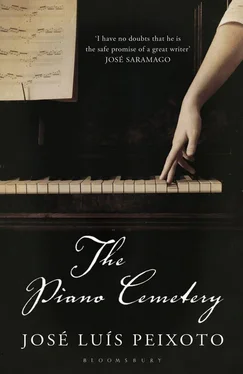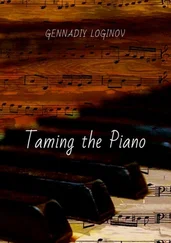as though a sudden new day were being born inside me, inside my flaming eyes. It feels like it’s not the world that exists burning before my eyes, but that it’s my eyes that create and burn this world before them. A whole world created by the flames that flow from my eyes. Now
from my heart. Again we are
because they’re calling all the runners to the starting line. I’m in the front row. Runners behind me come closer. I have my right shoe stuck to the line. There are runners, men of every race. Those next to me touch my arms with their elbows and I feel them slipping on my shining skin. We’re looking ahead, because we can see the future. Each of us has a heart beating in his chest. There’s a man in white trousers, a dark jacket, tie and straw hat who fires a shot into the air. The explosion spreads across the field and disappears, like a release of pigeons, like a useless memory, and it’s the voices of the people in the stands that really explode and fill the air, the sky and everything we can see and think. I take my first quick steps, trying to get away from the arms that are pushing to open a path. I stick out my arms to push open a path, too. Now, each step
a ray of sun, like a hand that grabs me and squeezes me against its skin, red-hot. It’s fire that each movement of my body passes through. They are flames in my eyes that open a path into which I go and through which I make my way. I am a unique force, incandescent and true. I get further and further away, and I know that forty kilometres from here I will be back. I’m getting further away and closer. There are forty kilometres between me and being here being someone else. And forty kilometres may be my whole life. All time from the moment I was born until the moment I die within a single moment that might be forty kilometres. Time won’t know me. I will be someone else. I won’t know the distance of time. And I will return to the stadium. I will return here. Myself alone, over metres and time
a shower of stones on to the track of the stadium. When I realise that one of my legs is going to take a step, it’s already the other leg that’s taking a step that’s even bigger and even faster. My legs — I marvel at their strength. The people who are filling up the stands are like a choir of shots, voices firing from every direction. Sometimes we notice a voice that’s left behind; then we notice another also left behind. We pass by as though we haven’t seen their faces, but we see them without looking at them. We sense them. Breathing doesn’t yet weigh on us. We have our heads to look around us. We don’t look. We complete a lap of the track and the confusion of the opening metres has been left behind us. We run spaced out enough to be strings of men
you are lovely in my heart.
in my skin, the voices of the stadium fade. Bit by bit, the sounds of the city begin — a team of horses held by the bridle, which almost take fright as we pass, which take a couple of nervous steps; the engine and the horn of an enthusiastic motorcar; dogs barking angrily; children
after work, I’d already gone out to train, I’d already come back home after my training, I’d already run water under my arms and down my neck, I’d already been sitting by the fire for quite some time, when my mother asked me to go and call my father from the taberna . I looked at my mother lit up by the
Kilometre one
oil lamp. I said nothing. I put on my jacket and left. It was night-time, it was cold, it was February. I walked in a lot of nights like this. I knew what would be waiting for me — I’d go into the taberna , the gaze of all the men, and one of them saying: look, he’s come for you already. And my father unable to let them be right. When I was smaller I’d pull at his arm saying: mother sent for you. And the other men would laugh and he would laugh, too. Later I stopped doing that. I didn’t want the word mother spoken there. I didn’t want my mother, lit up by the oil lamp, to be named there. That’s why I would just go in. My father and all the men knew why I had come in, without saying good evening, without looking anyone in the eye, walking towards my father. I didn’t have to say anything. They laughed, they offered me wine and I didn’t accept. Once one of the men, as a joke, held a glass of wine to my lips. My father pushed his arm and the glass broke on the floor. My father was looking at him, very serious. He looked away, fearful. There was silence until one of the men said: ‘Oh, what a waste of wine!’ And everyone laughed. After a beat my father laughed, too. Sometimes my presence would hurry him up. At other times it seemed he’d only leave when he wanted to leave. At other times we’d be the last to leave and I’d have to carry one of his arms over my shoulders, or had to grip him by the elbow, or had to walk behind him to stop him falling. And I had to listen to him. I had to reply to him. I had to wait for him if he wanted to throw up. That night, even before I reached the taberna , I stopped to listen. It was my father talking. With his voice moulded by the wine, he said: ‘As soon as he was born, I knew right away what my Francisco was capable of.’ He said, ‘Listen carefully to what I’m telling you, that boy will be capable of great things.’ Then someone started talking about something else. I hoped they’d forget the moment when those words were spoken. I went in. The gaze of all the men — look, he’s come for you already — and I don’t remember if we went home early or late that night, what I could never forget were the words my father said, that he never would have said to me directly, but which are repeated again and again in my memory. Whenever
to another street, to other houses. I run faster so that time will pass faster. The colour of the tall houses. The roofs of the houses. My breathing. I don’t want to focus on my breathing. The colour of the houses — toasted yellow, orange nearly brown, clay-coloured
this permanent sun, this heat, I feel a fresh breeze coming from the water which appears with the sudden recollection of a winter’s day, with the memory of the day my father died.
of my father lying under the light of the candles. Me looking at his dead face and remembering only his living face.
that the rhythm of the running shoes on the road becomes faster. I overtake a runner who, feeling me getting closer, turns his head to watch me pass
father’s face covered by a transparent tulle cloth. I looked at him, white, still, and the natural thing would have been for him to open his eyes and say my name, for him to look at me and say, ‘What are you waiting for, lad?’ The cold black echo of the chapel. I looked at him and found it hard to believe his voice would never be heard again.
even faster and I know that that’s why people age more quickly, they die, children are born. There is only one runner ahead of me. Each pace of mine is bigger or faster than two paces from this frightened runner, who still
my father dead, white, still, and I tried to retain the image of this sadness that destroyed me because I knew it wouldn’t be long before I didn’t even have this, didn’t have anything. They would take my father away and I would have to live my whole life without ever seeing him again.
going forwards, and the runner is getting closer and closer. The nearer I get the faster I want to run to overtake him. I keep on
for my sister Maria and my mother. They were together, sitting in chairs. The happy absence of my sister Marta was there, too, still recovering from the birth of Hermes. My brother Simão’s absence was there, too. Ever since the night when it happened, that thing we will never forget, Simão and my father never saw one another again. My father, his arm shaking, pointing at the door shouting: ‘Out!’ Shouting, ‘Out!’ Simão shouting, ‘You’ll never see me again!’ Shouting, ‘I’m never setting foot in this wretched house again!’ Then, years of silence. We didn’t talk about it, but we wanted to believe that on that day Simão would still appear. He was our father. Our only father, who had died. We wanted to believe that he might still appear. He didn’t. And we had no words, only hurt. My mother was next to Maria and had her head in her hands. My sister looked at me with dark eyes. There at the back I saw the face of the piano-tuner. I went towards him. His head tilted towards shadowy corners, towards the surface of the roof or towards empty chairs. He recognised me by the sound of my footsteps. In silence, in my hands, I took the hand he held out to me. The tuner had known my father for many years. His blind face was old and hurt. We looked at one another, as though we were exchanging secrets. And again, the echo of my footsteps — and I approached my father again — my father
Читать дальше












